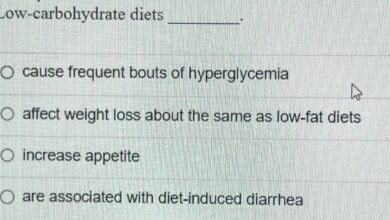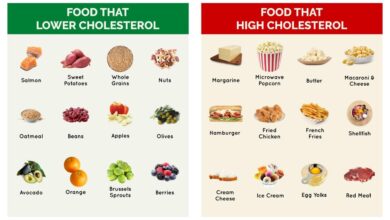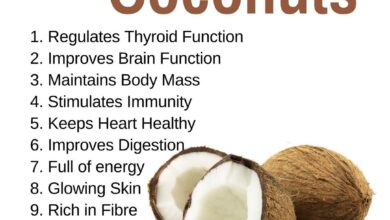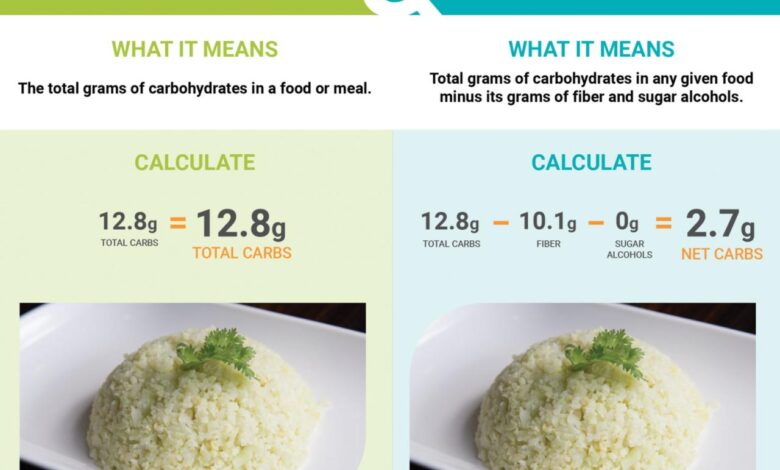
What Are Net Carbs: Understanding This Dietary Concept
What are net carbs? You’ve probably heard this term thrown around in the health and fitness world, but what does it actually mean? Net carbs are essentially the carbohydrates that your body actually absorbs and processes, taking into account the fiber that passes through your digestive system undigested.
This concept is crucial for those following low-carb diets, as it allows for a more accurate understanding of how carbohydrates impact your body.
This article dives deep into the world of net carbs, explaining the calculation, dietary implications, and potential benefits. We’ll explore how net carbs differ from total carbs, the role of fiber and sugar alcohols, and how this knowledge can help you make informed dietary choices.
Understanding Net Carbs
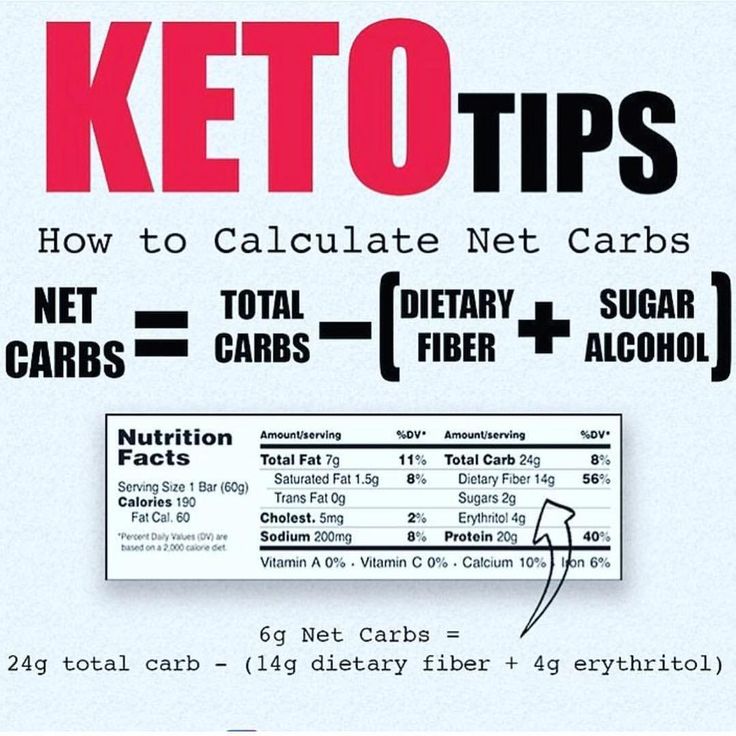
Net carbs, a term often encountered in the context of low-carb diets, represent a way of looking at carbohydrates that focuses on their potential impact on blood sugar levels. They are a valuable tool for individuals managing their carbohydrate intake for various health and weight management goals.
Definition and Calculation, What are net carbs
Net carbs are calculated by subtracting the amount of fiber from the total carbohydrate content of a food. Fiber, being a type of carbohydrate that our bodies cannot digest, does not affect blood sugar levels. Therefore, focusing on net carbs provides a more accurate picture of the carbohydrates that our bodies can actually absorb and utilize.
Net Carbs = Total Carbs
Fiber
For instance, if a food contains 20 grams of total carbs and 5 grams of fiber, its net carb content would be 15 grams (20
5 = 15).
Rationale for Focusing on Net Carbs
The rationale behind emphasizing net carbs in dietary planning stems from the understanding that different types of carbohydrates impact our bodies differently. While all carbohydrates are broken down into glucose, which our bodies use for energy, some are digested and absorbed more quickly than others.
Fiber, being indigestible, does not contribute to the rapid rise in blood sugar levels that can occur after consuming readily digestible carbohydrates. Therefore, by focusing on net carbs, we gain a better understanding of the carbohydrates that are likely to influence blood sugar levels and insulin response.
Net Carbs and Dietary Choices: What Are Net Carbs
Understanding net carbs can be particularly relevant when considering various dietary approaches. Net carbs play a significant role in determining the suitability of foods for different dietary plans.
Net carbs are a crucial factor for those following a low-carb diet, and they’re calculated by subtracting fiber from total carbs. A great low-carb recipe to try is this shrimp asparagus zoodle pasta , which uses zucchini noodles for a satisfying and healthy meal.
Understanding net carbs can help you make informed choices about your food and create delicious and fulfilling meals that fit your dietary needs.
Net Carbs and Popular Diets
Net carbs are a crucial factor in various dietary approaches, particularly those emphasizing carbohydrate restriction.
Net carbs are the total carbs in a food minus the fiber. So, if you’re trying to keep your net carb intake low, you’ll want to choose foods that are high in fiber and low in sugar. And if you’re looking for some inspiration for delicious, low-carb recipes, check out this article on thinking outside the lox , which is full of creative ideas for meals that are both tasty and healthy.
Knowing what net carbs are can help you make informed choices about your diet, and with a little creativity, you can still enjoy all your favorite foods!
- Ketogenic Diet:The ketogenic diet, often referred to as the keto diet, aims to induce a metabolic state called ketosis. Ketosis occurs when the body primarily uses fat for energy instead of carbohydrates. To achieve ketosis, individuals on a keto diet typically consume very low net carbs, usually under 20 grams per day.
- Low-Carb Diets:Low-carb diets, while not as restrictive as the keto diet, still emphasize limiting carbohydrate intake. These diets typically aim for net carb intake between 20 and 50 grams per day.
- High-Protein Diets:High-protein diets often focus on increasing protein intake while limiting carbohydrates. While net carb intake can vary depending on the specific high-protein diet, many individuals aim for moderate net carb consumption.
Foods Low in Net Carbs
Many foods are naturally low in net carbs, providing options for individuals following various dietary plans.
- Non-Starchy Vegetables:Vegetables like broccoli, spinach, cauliflower, and Brussels sprouts are excellent sources of nutrients with minimal net carbs.
- Meat and Poultry:Lean meats and poultry are naturally low in carbohydrates and provide a good source of protein.
- Fish and Seafood:Fish and seafood are also excellent sources of protein and contain minimal net carbs.
- Eggs:Eggs are a versatile and nutrient-rich food with negligible net carbs.
- Nuts and Seeds:Many nuts and seeds, such as almonds, walnuts, and chia seeds, are relatively low in net carbs and provide healthy fats.
- Berries:Berries like strawberries, raspberries, and blueberries are relatively low in net carbs compared to other fruits.
Net Carbs and Blood Sugar
Net carbs directly impact blood sugar levels and insulin response.
Net carbs are the total carbs in a food minus the fiber. This is important because fiber doesn’t get digested the same way as other carbs, so it doesn’t raise blood sugar levels. When ordering Chipotle, you can keep net carbs in mind by focusing on protein and veggies.
Check out healthy ways order chipotle for some helpful tips. With a little planning, you can enjoy a delicious and satisfying meal that fits your net carb goals.
Carbohydrates, particularly those with a high glycemic index, are rapidly digested and absorbed, leading to a rapid rise in blood sugar. This triggers the release of insulin, a hormone that helps regulate blood sugar levels.
- High Net Carb Intake:A high net carb intake can cause significant fluctuations in blood sugar levels, leading to insulin resistance and potential health issues.
- Low Net Carb Intake:Conversely, a low net carb intake can help stabilize blood sugar levels and reduce insulin spikes.
Considerations and Misconceptions
While understanding net carbs can be helpful for managing carbohydrate intake, it’s crucial to avoid common misconceptions and focus on a holistic approach to nutrition. Simply focusing on net carbs without considering the overall nutritional value of foods can lead to an imbalanced diet.
The Importance of Overall Nutritional Value
Focusing solely on net carbs can lead to neglecting other essential nutrients like fiber, vitamins, and minerals. While low-carb diets can be effective for weight loss, they may lack essential nutrients if not carefully planned.
It’s important to remember that net carbs are just one factor in a balanced and healthy diet.
Common Misconceptions
- Net carbs are always better than total carbs:This is not necessarily true. While net carbs can be a useful tool for managing carbohydrate intake, they don’t always reflect the overall nutritional value of a food. For example, a food with high net carbs but also rich in fiber and other nutrients might be more beneficial than a food with low net carbs but lacking in essential nutrients.
- All carbs are created equal:Different types of carbohydrates have different effects on blood sugar levels and overall health. For example, complex carbohydrates like those found in whole grains, legumes, and vegetables are digested more slowly and provide more sustained energy than simple carbohydrates like those found in refined grains and sugary drinks.
- Net carbs are the only factor to consider for weight loss:While reducing net carb intake can be helpful for weight loss, it’s not the only factor. Other important factors include overall calorie intake, physical activity levels, and hormonal balance.
Summary
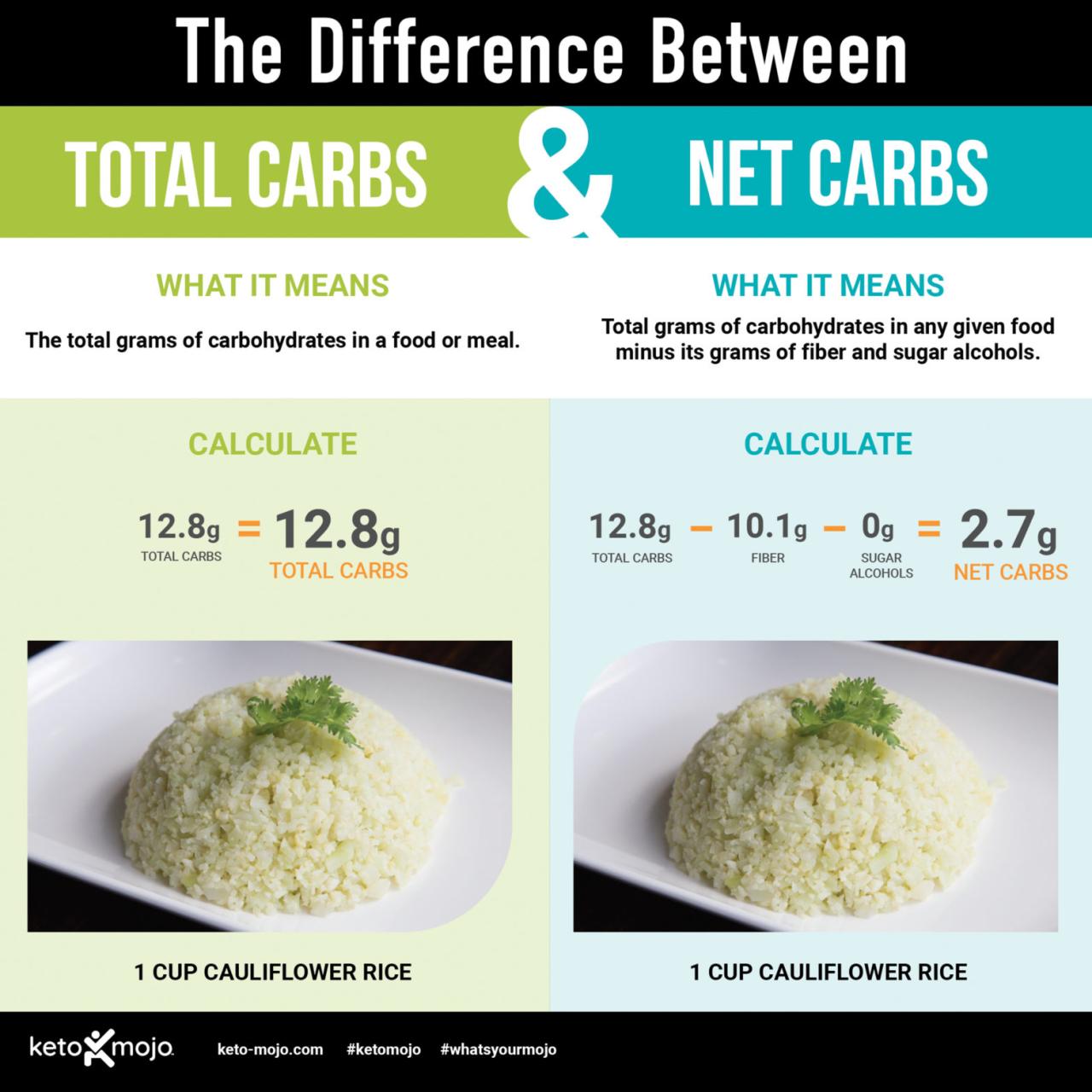
By understanding net carbs, you gain a powerful tool for managing your carbohydrate intake and making informed dietary choices. Whether you’re aiming for weight loss, better blood sugar control, or simply a healthier lifestyle, focusing on net carbs can help you achieve your goals.
Remember, net carbs are just one piece of the puzzle when it comes to overall health. A balanced diet rich in whole foods, regular exercise, and adequate hydration are crucial for optimal well-being.

